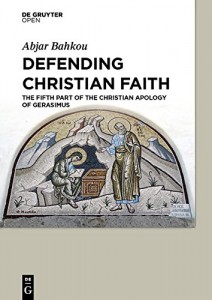 Christianity and Islam, the world’s two largest religions, have been engaged throughout history and interconnected for thousands of years. The relationship between the two faiths has historically been marked by conflict, but despite differences, there have also been many successful attempts at peace, mutual understanding and harmony. Dr. Abjar Bahkou in Baylor’s department of modern language and cultures highlights these examples in his book, Defending Christian Faith: The Fifth Part of the Christian Apology of Gerasimus.
Christianity and Islam, the world’s two largest religions, have been engaged throughout history and interconnected for thousands of years. The relationship between the two faiths has historically been marked by conflict, but despite differences, there have also been many successful attempts at peace, mutual understanding and harmony. Dr. Abjar Bahkou in Baylor’s department of modern language and cultures highlights these examples in his book, Defending Christian Faith: The Fifth Part of the Christian Apology of Gerasimus.
“Muslim-Christian relations have been subject to startling waves of events in history,” Bahkou said. “We can learn a lot and get ample food for thought and reflection when we look back at the past and examine the way Muslims and Christians lived and looked at each other. This book is a testimony of such interaction.”
Bahkou’s book presents a critical edition, commentary and English translation of an Arabic text that had been previously overlooked by scholars. It examines the fifth part of the Christian Apology by Gerasimus, Kitāb al-Kāfī fī al-Ma ͑nā al-Šāfī (The Complete Book of the Healing Meaning). Widely circulated in the Middle East between the 13th and 17th centuries, the text was used to provide guidance and help defend the Christian faith against its critics.
Bahkou hopes that his decade of work on this book will result in productive interfaith dialogue, which he says is not just about acknowledging the viewpoints of others, but rather recognizing the validity of other faiths and searching for commonalities that lead toward universal truths.
“Interfaith dialogue is a good way of testing how open we are in our minds and our hearts to people of other faiths,” Bahkou said. “It requires commitment to both truth and love. Dialogue between Christians and Muslims is a serious business; it is primarily concerned with the truth about God, oneself, fellow human beings and the world in which we live. Political correctness, ignorance, or theological relativism may lead to a superficial agreement between us. A confrontational debate, on the other hand, may run the risk of causing antagonism, which would hinder the search for truth. Only love, demonstrated through genuinely peaceful relationship, can create the necessary conditions for the truth to emerge and for mutual understanding to develop.”
Defending Christian Faith is available online at Amazon or De Gruyter.
This story is part of a series of research highlights by Caleb Barfield, a student web editor in the Office of the Vice Provost for Research. Caleb is a sophomore from Denton majoring in journalism, new media and public relations. Click here to read more of his work.

March 3, 2015 at 10:28 am
This is a very important topic! there must be more “Interfaith dialogue” so that people learn to respect each other’s beliefs.
Ruben Couto
Plane Magazine – http://www.planemagazine.com